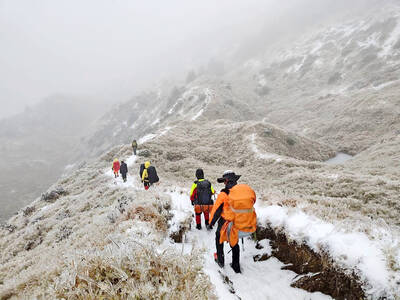US Principal Deputy Assistant Secretary of Defense for Asian and Pacific Security Affairs David Helvey on Thursday once again called into question Taiwan’s ability to protect sensitive technologies from Chinese spies, should the US agree to transfer them to Taiwan, at a symposium held by the Global Taiwan Institute in Washington.
The one-day event, titled “Upgrading US-Taiwan relations for the 21st century,” marked the institute’s first annual symposium.
Helvey posited the question whether Taiwanese businesspeople with obvious commercial benefits in China would be involved in Taiwan’s autonomous national defense projects.
US-Taiwan relations have been stiff since the Monterey Talks in Hawaii last month, at which both sides devoted significant time to the case of Hsieh Chia-kang (謝嘉康).
Hsieh, a former missile command commander, is still under investigation after reports in May said he had been turned by Chinese covert operatives.
Hsieh was accused of being treated to luxuries by Chinese intelligence operatives during trips abroad. As a former commander of the Air Defense Missile Command, Hsieh was fully briefed on deployments of all of the nation’s missiles, including the Patriot III, the Tien Kung III and the Hsiung Feng 2E cruise missile.
Helvey’s talk on Thursday was similar to his talk at the US-Taiwan Defense Industry Conference in October last year, a sign that the US doubts Taiwan’s capacity to protect military secrets as strongly under US President Donald Trump’s administration as it did under former US president Barack Obama.
While President Tsai Ing-wen’s (蔡英文) government favors self-manufactured defense systems and hopes the US can help the nation develop diesel submarines and trainer jets, Helvey said the US did not have much technology it could share to help Taiwan develop its national defense industry.
Transfer of sensitive technologies must conform to US standards and before Taiwanese and US private enterprises could sign partnership deals, new regulations must be introduced to prevent the inappropriate transfer of data and knowledge, he said.
Beijing showed no signs of abandoning the idea to occupy Taiwan by force, Helvey added.
He said that Taiwan’s defense transformation should focus on “prioritizing defense resourcing; prioritizing homeland defense; developing a capable, effective force; and investing in asymmetric capabilities.”
A key topic at the symposium was the possibility of the US stationing nuclear weapons in Taiwan, South Korea or Japan to force China to cooperate on North Korea.
Former US deputy assistant secretary of defense for East Asia Abraham Denmark rejected the idea of dragging Taiwan into the North Korean issue and said that such a strategy would not help add pressure on China.
Denmark recommended that the US’ focus should instead be on bolstering US-Taiwan defense ties and supporting Taiwan’s own defense capabilities, adding that it did not include providing the country with nuclear weapons.
Former assistant US secretary of defense, Asian and Pacific security affairs Wallace Gregson, who did not comment on nuclear weapons, was in favor of the US positioning a missile defense system in Taiwan should North Korea’s continued missile tests threaten the nation.
Talk in certain South Korean media about a redeployment of US nuclear weapons to Japan and South Korea was indicative of the region’s lack of trust in the US’ nuclear umbrella — the guarantee that the US will protect non-nuclear allied states, Denmark said.

Trips for more than 100,000 international and domestic air travelers could be disrupted as China launches a military exercise around Taiwan today, Taiwan’s Civil Aviation Administration (CAA) said yesterday. The exercise could affect nearly 900 flights scheduled to enter the Taipei Flight Information Region (FIR) during the exercise window, it added. A notice issued by the Chinese Civil Aviation Administration showed there would be seven temporary zones around the Taiwan Strait which would be used for live-fire exercises, lasting from 8am to 6pm today. All aircraft are prohibited from entering during exercise, it says. Taipei FIR has 14 international air routes and

The Ministry of National Defense (MND) today released images of the military tracking China’s People's Liberation Army (PLA) movements during the latest round of Chinese drills around Taiwan. The PLA began "Justice Mission 2025" drills today, carrying out live-fire drills, simulated strikes on land and maritime targets, and exercises to blockade the nation's main ports. The exercises are to continue tomorrow, with the PLA announcing sea and air space restrictions for five zones around Taiwan for 10 hours starting from 8:30am. The ministry today released images showing a Chinese J-16 fighter jet tracked by a F-16V Block 20 jet and the

Snow fell on Yushan (Jade Mountain, 玉山) yesterday morning as a continental cold air mass sent temperatures below freezing on Taiwan’s tallest peak, the Central Weather Administration (CWA) said. Snowflakes were seen on Yushan’s north peak from 6:28am to 6:38am, but they did not fully cover the ground and no accumulation was recorded, the CWA said. As of 7:42am, the lowest temperature recorded across Taiwan was minus-5.5°C at Yushan’s Fengkou observatory and minus-4.7°C at the Yushan observatory, CWA data showed. On Hehuanshan (合歡山) in Nantou County, a low of 1.3°C was recorded at 6:39pm, when ice pellets fell at Songsyue Lodge (松雪樓), a

NO SHAME IN RETREAT: Hikers should consider turning back if the weather turns bad or if they do not have sufficient equipment, the Taroko park headquarters said Two people died of hypothermia over the weekend while hiking on Hsuehshan (雪山), prompting park authorities to remind hikers to bring proper equipment and consider their physical condition before setting out in the cold weather. Temperatures dropped over the weekend, bringing snow to high altitudes in Shei-pa National Park. One hiker, surnamed Lin (林), who on Friday was traveling with a group of six along the Hsuehshan west ridge trail, lost consciousness due to hypothermia and died, the Shei-pa National Park Headquarters said. On Saturday, another hiker, surnamed Tien (田), in a group of five on the southeast of the west